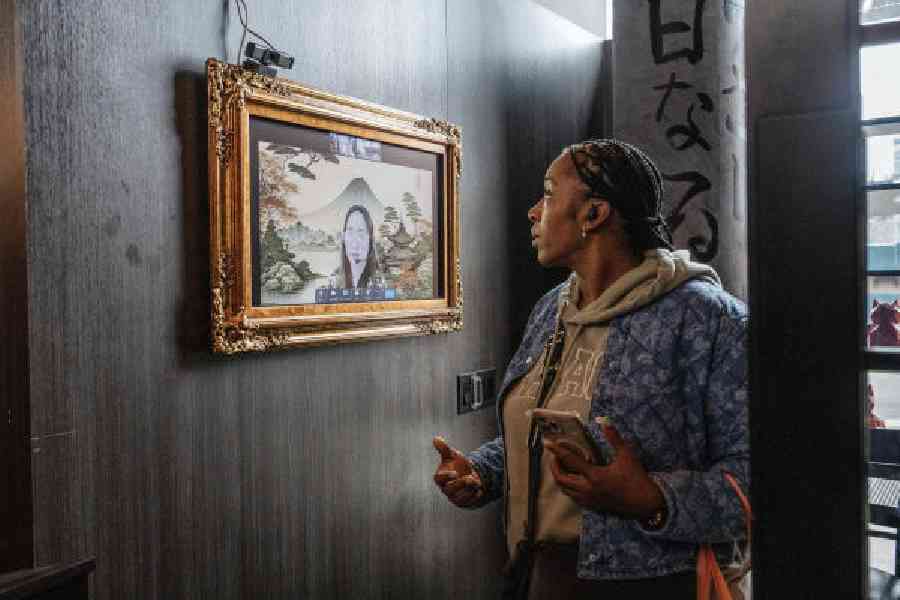At Sansan Chicken in Long Island City, US, the cashier gave a wide smile and recommended the fried chicken sandwich. Or maybe she suggested the tonkatsu — it was hard to tell, because the Internet connection from her home in the Philippines was spotty.
Romy is one of 12 virtual assistants greeting customers at some restaurants in New York City, from halfway across the world.
The virtual hosts could be the vanguard of a rapidly changing restaurant industry, as small-business owners seek relief from rising commercial rents and inflation. Others see a model ripe for abuse: the remote workers are paid $3 an hour, while the minimum wage in the city is $16.
The workers, based in the Philippines and projected onto screens via Zoom, are summoned when a customer approaches. Despite a 12-hour time difference with the New York lunch crowd, they offer warm greetings, explain the menu and beckon guests inside.
But sceptical customers said they were not eager to join this particular Zoom meeting.
“You hear ‘hello’ and you say, ‘What the hell is that?’” Shania Ortiz, 25, recalled of a recent trip to Sansan Ramen, a Japanese restaurant that had a gold-framed, monitor set up in the foyer with a surveillance camera trained on guests. “I never engage,” she said.
The service is the brainchild of Chi Zhang, 34, founder of Happy Cashier, a virtual-assistant company that was thrust into the spotlight, when a social media post about the workers went viral.
Zhang was caught off guard. The programme has been quietly tested since October, but the company’s website has not yet been set up. The tech is available in stores in Queens, Manhattan and Jersey City, including at Sansan Ramen, Sansan Chicken and Yaso Kitchen. Two other restaurants on Long Island asked not to be named.
Zhang is a former owner of Yaso Tangbao, a Shanghainese restaurant in Brooklyn that closed during the coronavirus pandemic. He said the experience reinforced the idea that restaurants were being squeezed by high rents and inflation, and that a virtual-assistant model, somewhat akin to that employed by overseas call centres, could help maximise small retail spaces and improve efficiency.
When the virtual assistants are not helping customers, they coordinate food delivery orders, take phone calls and oversee the restaurants’ online review pages, Zhang said. They can’t manage cash transactions.
The workers are employees of Happy Cashier, not the restaurants. The $3-an-hour wage was roughly double what similar roles paid in the Philippines, Zhang said.
Tipping policy is set by the restaurants, he said, with one giving its virtual greeters 30 per cent of the pooled total each day.
The restaurant industry has long been an entry point for immigrants and a hotbed for labour violations such as wage theft.
But the Happy Cashier model is legal and minimum wage laws extend only to workers “who are physically present within the state’s geographical limits”, said a spokesperson for the New York State Department of Labor.
Zhang said he expected to quickly scale up by placing virtual assistants in over 100 restaurants in the state by the end of the year.
“The fact that they have found a way to outsource work to another country is extremely troubling because it’s going to dramatically put downward pressure on wages in the industry,” said Teófilo Reyes, the chief of staff at Restaurant Opportunities Centers United, a nonprofit labour group.
At the Sansan Chicken in Manhattan’s East Village, Rosy Tang, 30, a manager, praised the service.
“This is a way for small businesses to survive,” she said, adding that the cost and space savings it provided could allow her to add a small coffee stall to the store.
In practice, however, quirks with the model abound.
Will Jang, 30, an associate at Goldman Sachs, had lunch at the Yaso Kitchen in Jersey City recently — and completely ignored his virtual host, Amber.
“I thought it was some advertisement,” like the pre-recorded videos in taxi cabs, he said.
NYTNS











